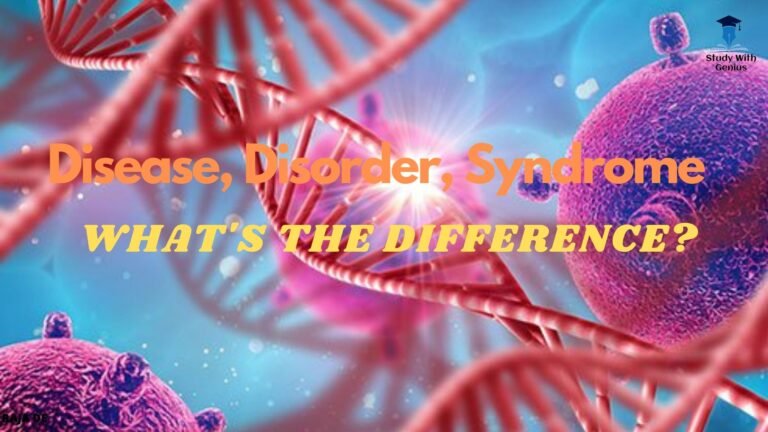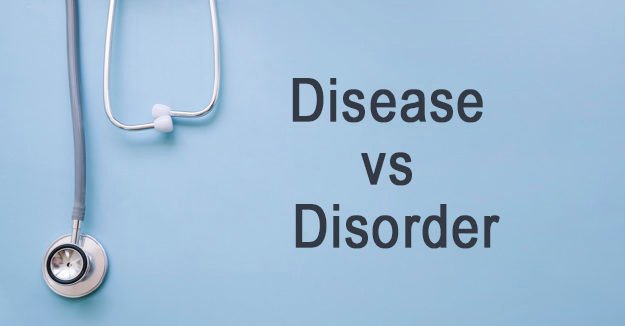
Difference between Disease and Disorder and Syndrome
From Symptoms to a Diagnosis of diseases
Difference between Disease and Disorder and Syndrome : Symptom, syndrome, disorder, and disease are all terminology used to categorize how our health is affected in a hierarchy. The signs and symptoms are the first things we notice that point to a problem. A syndrome is defined as a collection of symptoms that occur at the same time.
Knowing the condition aids doctors in determining the disorder by allowing them to examine your health. There is frequently no direct hint that the symptoms are caused by a single factor at that point. After the cause of the disorder has been identified, the disease can be diagnosed.
It can take years to get a diagnosis of an autoimmune disease. You may have a slew of symptoms that indicate you have an autoimmune condition, but no definitive diagnosis. Your condition, or how you feel on a daily basis, may change throughout the time it takes to acquire an accurate diagnosis.
Your doctor may diagnose you with arthritis if you are having arthritis symptoms such as joint discomfort. You have an arthritic syndrome or disorder if you don’t know what’s causing your symptoms. Arthritis syndromes and illnesses are frequently referred to as “arthritis.”
You will be told of the disease once the reason of your arthritis is discovered. Every disease has a distinct cause. The immune system attacking the joints is the cause of autoimmune diseases.
What is Syndrome?
A syndrome is a group of observable characteristics or disorders that frequently occur together and are related to a specific disease. A syndrome is essentially a grouping of traits or distinguishing characteristics.
In fact, the phrase derives from the Greek words “syn” for “together” and “drome” for “run.” So, this is a set of results that you’ll see in a group of people that aren’t related in every way.
The majority of syndromes are named after the doctor who was the first to detect them in patients. As an example, Down syndrome is a condition that was initially identified by Dr. Down. Dr. Marfan was the first to recognize the symptoms of Marfan syndrome. There is a long list of these syndromes, perhaps hundreds of them, that have been documented largely in medicine over the previous 150 years or so, and are often called after the person who first noticed that these traits tended to run together.
Genetic mutations and other causes can produce medical disorders.

What is Disease?
A disorder is defined by impairment in function and a disruption in the body’s normal structure and function. The immune disorder rheumatoid arthritis is classified as.
Autoimmune disorders are a set of diseases in which the immune system attacks the body itself rather than outside things such as viruses or bacteria that enter the body. The immune system targets the joints in the case of RA.
A disease is a condition that is defined by 3 factors.
- There is a known biological cause for the illness.
- a specific set of symptoms
- Anatomical changes that occur frequently as a result of the condition
None of these characteristics are present in a syndrome. Even the symptoms that are present are rarely constant and cannot be linked to a single source.
The symptom caused by a condition does not have a known cause. When a disease occurs, the reason is determined. A syndrome’s treatment is primarily symptomatic. When a disease occurs, the underlying cause is addressed. A sickness produces changes in the anatomy; a condition, on the other hand, may not.

What is Disorder?
A disorder is defined by impairment in function and a disruption in the body’s normal structure and function. The autoimmune disease rheumatoid arthritis is categorized as.
Autoimmune disorders are a set of diseases in which the immune system attacks the body itself rather than outside things such as viruses or bacteria that enter the body. The immune system targets the joints in the case of RA.
Disorders can be classified into the following areas:
- Physical : Physical disorders are issues that can be detected by tests such as brain scans or chemical tests.
- Genetic : A mutation or damage to DNA produced by a sickness or disease is known as a Genetic condition.
- Structural : A structural disorder is a type of physical injury to an organ. For example, communication issues resulting from brain damage.
- Mental : The deviation of behavioral features induced by certain discomfort or impairment of personal functioning is also known as mental illness.

Difference between Disease & Disorder
1. Disease
- A disease, according to a few articles, is a specific title applied to concepts of illness.
- In other words, we’ve devised a process that links particular symptoms to a certain physical condition.
- A disease can also be described as the body’s pathological response to either various stimuli.
- Abnormalities that might cause physical or emotional stress and pain are referred to as diseases.
- Such abnormalities provide the basis for disease therapy.
2.Disorder
- The breakdown of normal body functions is thought to be a disorder.
- A Disorder is caused because of the presence of disease in the body.
- According to a few articles, disorder simply means that something is wrong with the body.
- In a few articles, it is also said that disorder simply signifies that something is wrong with the body.
What is Condition?
A health condition that interferes with daily activities or a sense of well-being. A syndrome can be caused by a variety of disorders or be a medical condition in and of itself. Chronic fatigue syndrome, for example, is a neurological condition characterized by a slew of symptoms in addition to the core symptom of post-exercise malaise.
Syndrome vs Disease
A syndrome is a collection of symptoms that are linked to a certain condition. The syndrome can aid in the diagnosis of the disease.
A syndrome is a collection of symptoms, whereas a disease is an existing condition. A disease is a condition that is defined by three main characteristics. None of these characteristics are present in a syndrome. Even the symptoms that are present are rarely constant and cannot be linked to a single source.









